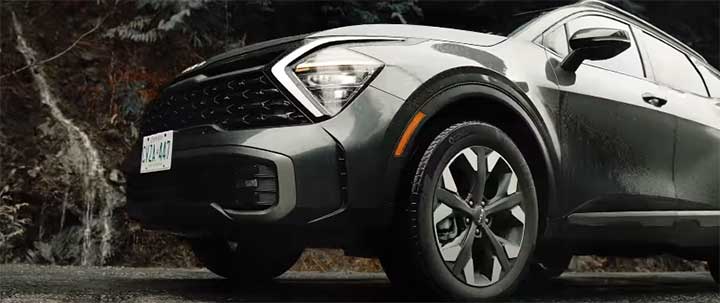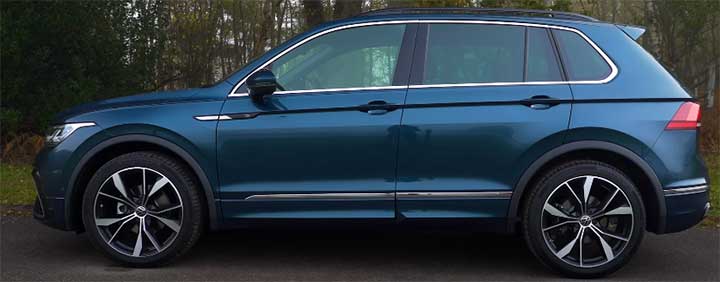Looking for your next perfect SUV match?
We’ve got you covered! Today, we’re diving deep into two contenders that are ruffling feathers in the compact SUV market – the Kia Sportage and the Volkswagen Tiguan. Each of these vehicles brings something unique to the table, but how do they stack up against each other?
Buckle up and let’s find out.
A Brief Comparative Table
| Feature | Kia Sportage | Volkswagen Tiguan |
| Base Engine | 2.4-liter four-cylinder with 181 HP | 2.0-liter turbo-four with 184 HP |
| Top Engine | 2.0-liter turbo-four with 240 HP | N/A |
| Fuel Economy (City/Hwy) | 23/30 mpg | 22/29 mpg |
| Standard Infotainment | 8-inch touchscreen with Apple CarPlay and Android Auto | 6.5-inch touchscreen with Apple CarPlay and Android Auto |
| Optional Infotainment | 10.25-inch touchscreen | 8-inch touchscreen |
| Base Price | $23,990 | $25,245 |
| Maximum Seating Capacity | 5 | 7 (with optional third row) |
| Passenger Space | Adequate in the front, a bit tight in the rear | Ample space in both rows |
| Cargo Space | 30.7/60.1 cubic feet | 37.6/73.5 cubic feet |
| Available AWD | Yes | Yes |
| Standard Safety Features | Rearview camera, lane keep assist, and forward collision warning | Rearview camera, blind-spot monitoring, and forward collision warning |
Kia Sportage: The Pros

- Stylish Design: Right off the bat, the Kia Sportage impresses with its edgy and sporty design. It’s a head-turner that speaks to modern tastes, offering a refreshing alternative to the usual suburban SUV aesthetic.
- Advanced Tech: Kia has packed the Sportage with an array of smart features. With a generous infotainment system, wireless charging, Apple CarPlay, and Android Auto, it’s a tech lover’s dream.
- Safety First: With the Sportage, safety is paramount. Kia’s advanced suite of driver-assist technologies, including blind-spot detection and rear cross-traffic alert, provide peace of mind on every journey.
Kia Sportage: The Cons
- Fuel Efficiency: While the Sportage has many admirable qualities, its fuel efficiency isn’t one of them. Compared to other vehicles in its class, it falls a bit short.
- Interior Space: Although the Sportage provides ample room for front-row occupants, the backseat legroom can feel a bit tight, especially for taller passengers.
Also Read: Differences Between GMC Terrain And Ford Escape.
Volkswagen Tiguan: The Pros
- Spaciousness: When it comes to space, the VW Tiguan wins hands down. With room for up to seven passengers, this is one of the few compact SUVs that truly lives up to the “family car” label.
- Performance: The Tiguan is well-equipped with a turbocharged engine that offers a smooth, quiet ride. Its power delivery is refined and the handling is secure, making it a pleasure to drive.
- Quality Interiors: The Tiguan boasts high-quality interior materials, exuding an aura of luxury and sophistication that few other compact SUVs can match.
Volkswagen Tiguan: The Cons
- Pricey Packages: While the base model Tiguan offers good value, optional packages can quickly push up the price. To access some of the most desirable features, you’ll need to dig deeper into your pockets.
- Fuel Economy: Like the Sportage, the Tiguan isn’t a class leader in fuel economy. It’s decent, but not particularly impressive for the segment.
Key Differences Between Kia Sportage and Volkswagen Tiguan

When we delve deeper into the details, the distinction between the Kia Sportage and Volkswagen Tiguan becomes even more evident.
- Performance & Handling
The Sportage comes with a 2.4-liter four-cylinder engine that produces 181 horsepower, while its top-end GT-line variant boasts a 2.0-liter turbo-four with 240 horsepower.
Its performance is admirable, but not necessarily stellar. The ride is comfortable enough, and the handling is stable, but it lacks the sporty feel you may expect given the name.
The Tiguan, on the other hand, offers a 2.0-liter turbo-four engine across all variants, producing 184 horsepower. It’s not as potent as the Sportage’s top engine but delivers power smoothly, providing a quiet and calm driving experience.
The Tiguan’s suspension is also fine-tuned for comfort, and it handles road irregularities with grace.
- Interior Quality & Comfort
Inside the Sportage, you’ll find a modern and well-laid-out cabin. The materials used are solid and durable but not quite as luxurious as you’d find in some competitors. The front seats are roomy, but the rear seats can feel a bit cramped for taller passengers.
Step inside the Tiguan, and you’re greeted with a high-quality, sophisticated interior. There’s a noticeable level of luxury in the materials and design. Additionally, the Tiguan shines when it comes to space.
It provides generous legroom and headroom in both rows, and it’s one of the few compact SUVs that offer an optional third row.
- Tech Features
The Kia Sportage is a tech-forward vehicle. It comes standard with an 8-inch touch screen, Apple CarPlay, Android Auto, a six-speaker audio system, and a USB port.
Higher trims offer a larger 10.25-inch touch screen, a wireless charging pad, an upgraded eight-speaker Harman Kardon audio system, and additional USB ports.
The Volkswagen Tiguan comes standard with a 6.5-inch touch screen, Apple CarPlay, Android Auto, and a Wi-Fi hot spot. Higher trims feature an 8-inch touch screen, a nine-speaker Fender audio system, and wireless device charging.
However, it’s worth noting that many of these upgrades come as part of optional packages, which can increase the cost significantly.
Also Read: Differences Between Audi Q5 And Mercedes GLC 300.
Frequently Asked Questions (FAQ)
While the Kia Sportage offers a compact and comfortable ride, the VW Tiguan is larger, offering more space, including an optional third row of seats.
It depends on your personal needs. The Volkswagen Tiguan offers more space, a luxurious feel, and smooth performance. However, if you prefer a sporty design, advanced tech, and a lower price point, then the Kia Sportage might be the better fit.
The Volkswagen Tiguan is often compared to the likes of the Kia Sportage, Toyota RAV4, Honda CR-V, and Mazda CX-5 in the compact SUV segment.
Volkswagen Tiguans have generally proven to be reliable vehicles. However, keep in mind that the reliability can depend on factors such as maintenance, mileage, and the year of the model.
In Conclusion
When comparing the Kia Sportage and the Volkswagen Tiguan, it’s clear that both SUVs have strong selling points. The Sportage is a techie’s dream with an edge in design, while the Tiguan impresses with its spaciousness and refined interiors.
However, both could improve their fuel economy. In the end, your decision will hinge on what factors matter most to you. Good luck, and may your next drive be your best one yet!

